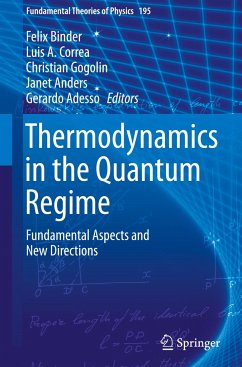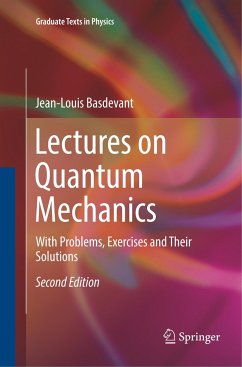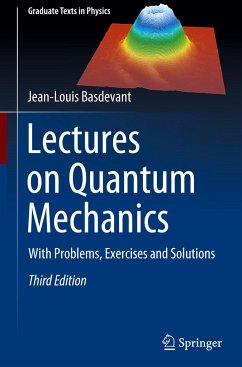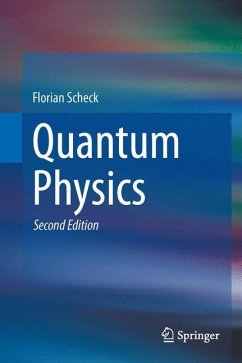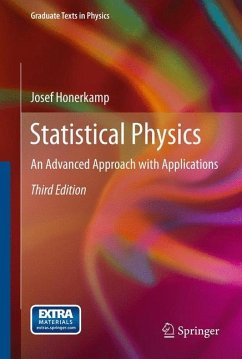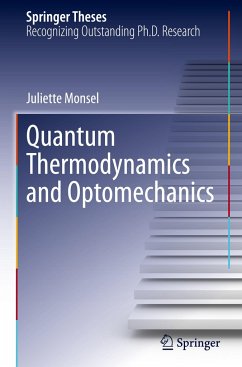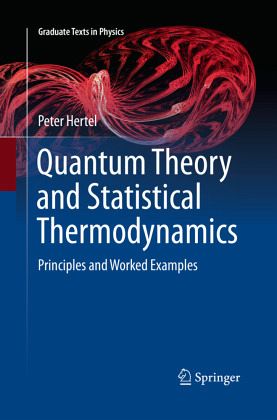
Quantum Theory and Statistical Thermodynamics
Principles and Worked Examples
Versandkostenfrei!
Versandfertig in 6-10 Tagen
53,99 €
inkl. MwSt.
Weitere Ausgaben:

PAYBACK Punkte
27 °P sammeln!
This textbook presents a concise yet detailed introduction to quantum physics. Concise, because it condenses the essentials to a few principles. Detailed, because these few principles - necessarily rather abstract - are illustrated by several telling examples. A fairly complete overview of the conventional quantum mechanics curriculum is the primary focus, but the huge field of statistical thermodynamics is covered as well.The text explains why a few key discoveries shattered the prevailing broadly accepted classical view of physics. First, matter appears to consist of particles which, when pr...
This textbook presents a concise yet detailed introduction to quantum physics. Concise, because it condenses the essentials to a few principles. Detailed, because these few principles - necessarily rather abstract - are illustrated by several telling examples. A fairly complete overview of the conventional quantum mechanics curriculum is the primary focus, but the huge field of statistical thermodynamics is covered as well.
The text explains why a few key discoveries shattered the prevailing broadly accepted classical view of physics. First, matter appears to consist of particles which, when propagating, resemble waves. Consequently, some observable properties cannot be measured simultaneously with arbitrary precision. Second, events with single particles are not determined, but are more or less probable. The essence of this is that the observable properties of a physical system are to be represented by non-commuting mathematical objects instead of real numbers.
Chapters on exceptionally simple, but highly instructive examples illustrate this abstract formulation of quantum physics. The simplest atoms, ions, and molecules are explained, describing their interaction with electromagnetic radiation as well as the scattering of particles. A short introduction to many particle physics with an outlook on quantum fields follows. There is a chapter on maximally mixed states of very large systems, that is statistical thermodynamics. The following chapter on the linear response to perturbations provides a link to the material equations of continuum physics. Mathematical details which would hinder the flow of the main text have been deferred to an appendix.
The book addresses university students of physics and related fields. It will attract graduate students and professionals in particular who wish to systematize or refresh their knowledge of quantum physics when studying specialized texts on solid state and materials physics, advanced
optics, and other modern fields.
The text explains why a few key discoveries shattered the prevailing broadly accepted classical view of physics. First, matter appears to consist of particles which, when propagating, resemble waves. Consequently, some observable properties cannot be measured simultaneously with arbitrary precision. Second, events with single particles are not determined, but are more or less probable. The essence of this is that the observable properties of a physical system are to be represented by non-commuting mathematical objects instead of real numbers.
Chapters on exceptionally simple, but highly instructive examples illustrate this abstract formulation of quantum physics. The simplest atoms, ions, and molecules are explained, describing their interaction with electromagnetic radiation as well as the scattering of particles. A short introduction to many particle physics with an outlook on quantum fields follows. There is a chapter on maximally mixed states of very large systems, that is statistical thermodynamics. The following chapter on the linear response to perturbations provides a link to the material equations of continuum physics. Mathematical details which would hinder the flow of the main text have been deferred to an appendix.
The book addresses university students of physics and related fields. It will attract graduate students and professionals in particular who wish to systematize or refresh their knowledge of quantum physics when studying specialized texts on solid state and materials physics, advanced
optics, and other modern fields.





